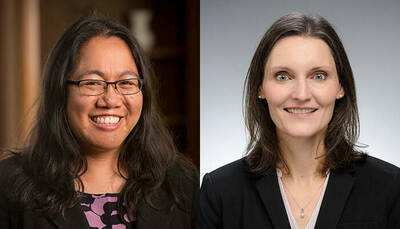
The University of Notre Dame will join a select group of universities focused on ensuring their research benefits society.
The Center for Advancing Research Impact in Society (ARIS) has selected Notre Dame to join its 2023 Program to Enhance Organizational Research Impact Capacity (ORIC), along with seven other institutions.
Patricia Clark, associate vice president for research and the O’Hara Professor of Chemistry & Biochemistry, said, "As the University of Notre Dame builds infrastructure to expand the public reach and societal contributions of our researchers, we are excited to learn about potential models and approaches from the ORIC team and other cohort participants."
The other institutions selected for the 2023 cohort are Binghamton University, Florida State University, Texas A&M University, University at Buffalo, University of Alabama, University of Michigan, and the University of Wyoming.
ARIS will provide professional development, resources, mentoring, and community-building to institutions and organizations that apply through a competitive process to participate.
The program is cohort-based, with each cohort training period lasting one year. During that year, broader impacts professionals participate in an intensive training series designed and led by ARIS, followed by nine additional months of application and practice which is overseen and mentored by members of the ARIS training team.
A team made up of members from Notre Dame's new Center for Broader Impacts (CBI), the Office of Clinical Partnerships, and Notre Dame Research and Proposal Development will coordinate Notre Dame's participation in ORIC and help implement changes and expand support for broader impacts at the University.
ARIS Executive Director Susan Renoe said, “Through ORIC, ARIS empowers institutions to enhance their internal infrastructure for research impact support. We have seen great results with the institutions who have already been a part of ORIC, and we are excited for eight more institutions to benefit from the unique features of the ORIC program.”
To date, 20 institutions have participated in the ORIC Program. To learn more about these institutions and who represented each institution, please see the Pilot Cohort, 2021 Cohort, and 2022 Cohort.
Contact:
Brett Beasley / Writer and Editorial Program Manager
Notre Dame Research / University of Notre Dame
bbeasle1@nd.edu / 574.631.8183
research.nd.edu / @UNDResearch
About Notre Dame Research:
The University of Notre Dame is a private research and teaching university inspired by its Catholic mission. Located in South Bend, Indiana, its researchers are advancing human understanding through research, scholarship, education, and creative endeavor in order to be a repository for knowledge and a powerful means for doing good in the world. For more information, please see research.nd.edu or @UNDResearch.
About ARIS:
The Center for Advancing Research Impact in Society (ARIS) works with U.S. and international scientists and engagement practitioners to build capacity, advance scholarship, grow partnerships, and provide resources to help them engage with and demonstrate the impact of research in their communities and society. Founded in September 2018 and housed at the University of Missouri, with support from the National Science Foundation (NSF), the ARIS Center (ARIS, OIA #1810732) emphasizes support for serving traditionally underserved populations while providing inclusive public engagement to ensure a diverse science workforce. The work of the center is beneficial to researchers who increase knowledge and discovery, to practitioners who collaborate with researchers and community stakeholders, and to the public who benefit from research and education advancements. ARIS is home to a thriving community of practice including more than 1,000 members.